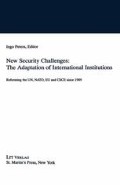Abstract
In November 1990, the (at that time) 34 CSCE states met at the Paris Summit of heads of states and governments. They adopted the Paris Charta for a New Europe1 which contained basic principles and rules for an intesified co-operation after the East-West conflict had been resolved. Part and parcel of the Charta was the decision to strengthen the CSCE using new structures and institutions which was meant as a cooperative response to the security challenges of the new era. The Paris decisions comprised the following institutional elements:2
-
On the political level a network of regular high-level meetings — summits, council of foreign ministers, follow-up meetings (later: review conferences) were established or formalised. Additionally, periodical meetings of high ranking government officials and diplomats (Committee of Senior Officials) were created to prepare council meetings and to implement common decisions.
-
On a functional level
-
a.
Permanent organs were created which provide a small but effective international bureaucracy as a continuous organisational framework for CSCE activities. These working units, on the one hand, give administrative support to the political level (Secretariat in Prague), and on the other hand, specialised agencies carry out various assignments and are in charge of specific policy areas (Bureau of Free Elections in Warsaw, Conflict Prevention Centre in Vienna).
-
b.
Instruments for implementing agreed measures have been developed. Dependant on the areas of assignment, these instruments are ascribed to either the political forums or the organs. Mechanisms provide prearranged procedures for consultations and decision-making in conflicts or crisis situations. For example, the purpose of the mechanism for “unusual military activities” (para. 17, Vienna Document 1990) is to deal with acute threat perceptions, another, the “human rights mechanism” can help to tackle acute concern regarding violations of human rights. These mechanisms for example, facilitate the sending of fact-finding or observer missions to gain or verify information, thus serving as basis for political decisions and measures on the national or international level.
Ingo Peters is associate professor at the Political Science Department, Free University of Berlin, and executive director of the Department’s Center on Transatlantic Foreign and Security Policy Studies. He gratefully acknowledges the research assistance of Henning Riecke, Kai Radtke, and the editorial assistance of Amanda Linton and Genevieve Libonati.
This article is a transcript of an overview chapter from the author’s forthcoming book on Germany’s policy regarding institutionalisation of the CSCE 1989–1994, resulting from a project funded by the Deutsche Forschungsgemeinschaft, Bonn (1992/93).
Access this chapter
Tax calculation will be finalised at checkout
Purchases are for personal use only
Preview
Unable to display preview. Download preview PDF.
Editor information
Copyright information
© 1996 Lit Verlag
About this chapter
Cite this chapter
Peters, I. (1996). The “Old” and the “New” CSCE — Institutional Quality and Political Meaning. In: Peters, I. (eds) New Security Challenges: The Adaptation of International Institutions. Palgrave Macmillan, New York. https://doi.org/10.1007/978-1-137-05126-4_4
Download citation
DOI: https://doi.org/10.1007/978-1-137-05126-4_4
Publisher Name: Palgrave Macmillan, New York
Print ISBN: 978-1-349-61409-7
Online ISBN: 978-1-137-05126-4
eBook Packages: Palgrave Political & Intern. Studies CollectionPolitical Science and International Studies (R0)

